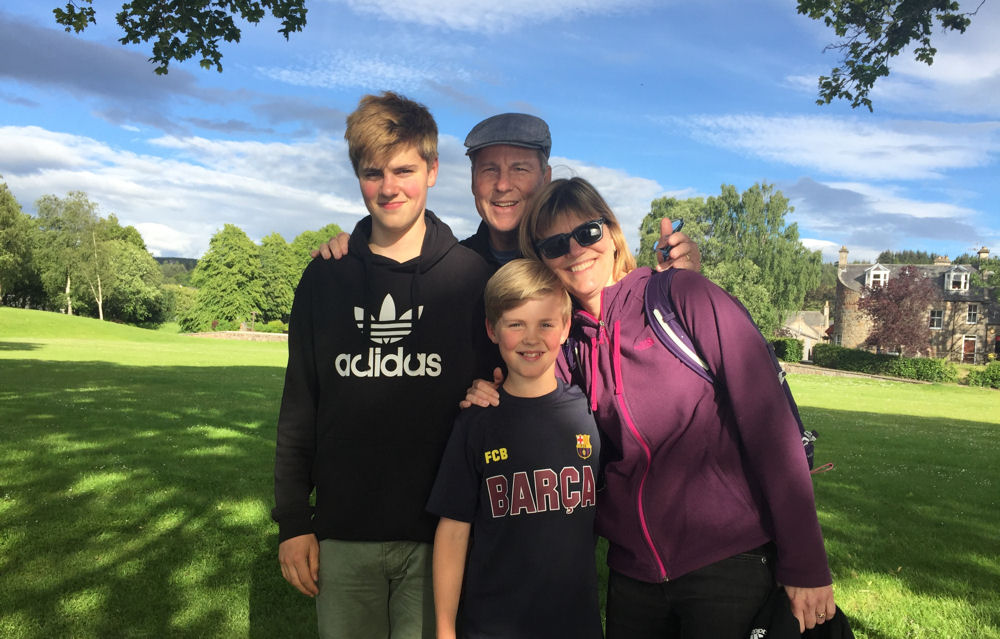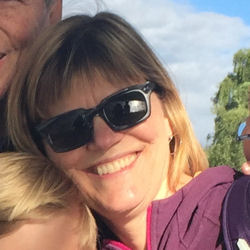

Elizabeth A. Stephens, MD, FACP
Medical Director, Providence Endocrinology East and West, Portland, OR
— MEDICAL SCHOOL —
Vanderbilt University Medical School, Nashville, TN
— RESIDENCY —
Oregon Health Sciences University, Portland, OR
Getting through residency is hard enough. It gets even more difficult when you're trying to manage your own chronic disease.
Dr. Elizabeth Stephens developed Type 1 diabetes in her third year of medical school. “Residency was really difficult with the long hours, the intense patient interactions, the stress, and then also trying to stay well with diabetes. That was a really challenging time in my life, but when I came out of that I felt very proud that I didn't veer off course. I stayed, I finished on time and I went on straight ahead and did a fellowship. I felt pretty resilient that I made it through that,” she says.
She recalls an incident as a second-year resident when she was in the call room when two more residents entered the room. “They were talking about someone who'd been admitted and they were talking in a sort of an annoyed way about ‘that’ diabetic. They said things like, ‘if he would just stop, if he would just check his blood sugar, I wouldn't be admitting him at 2 in the morning.’ There was a lot of blame and a lot of shame and at the time I was just really shocked.
“They just didn't get how hard it is and how much time it takes and how smart you have to be with all these components that go into managing chronic disease. It was that moment that I thought I might have something to offer in terms of perspective for people living with chronic disease. It was at that point that I committed to doing endocrinology,” says Dr. Stephens.
Solving Problems
I just really liked the problem solving of internal medicine. And I also really like the relationships that came with internal medicine.
Dr. Stephens initially chose internal medicine because it appealed to her strengths in communication, working with people, and collaborating. “I just really liked the problem solving of internal medicine. And I also really like the relationships that came with internal medicine. In medical school, I thought I was going to do a thousand different things. But then internal medicine really just seemed like the most interesting thing in medical school. And then as I moved to residency, I decided to specialize.”
Her internal medicine training has been invaluable in her endocrinology career. “Honestly, as an endocrinologist, I feel like I still use a lot of my internal medicine skills. A lot of specialties are procedural and very specialized. In endocrinology, you still do a lot of the same things that you do in internal medicine, thinking through people's medical issues. There's a lot of diagnostics and problem solving. Endocrinology is full of all these really unusual diagnoses and mysterious things. It's a really interesting specialty. It's a lot of the same ideas that were similar in internal medicine. Endocrinology was just kind of an extension of that interest.”
I'm proud to be a member because ACP gives support to everyone, not only people who are out of training. It's a really robust community.
She first joined ACP as a resident where she was encouraged to take part in the poster presentations at regional meetings. She moved to Colorado for a fellowship and got involved again with the Oregon Chapter when she moved back to Portland. “It's a really good, inclusive community that's very proactive,” she says of the Oregon Chapter. “It's still a lot of the same people that I trained with, a lot of good friends. So it's just been a great community to be a part of. I'm actually a Fellow of ACP, and I really appreciate the advocacy they do. There are a lot of great reasons to be a part of ACP, even more so than some of the specialty organizations, quite honestly.
“I'm proud to be a member because ACP gives support to everyone, not only people who are out of training. It's a really robust community. There's a lot of engagement from med students on up. It's a great chance to meet people, to stay connected with people who are further along in their path, to get mentorship, and to be involved in committees,” says Dr. Stephens, who served as co-chair of the Oregon ACP Chapter's Council for Women Physicians from 2011 to 2014.
Meditation on Wheels
Her busy schedule can make it difficult to get time to herself, which is why Dr. Stephens rides her bike to work each day, weather permitting. “It's about six miles each way and if the weather isn't too bad it takes about 25 minutes. Biking really gives me a chance to have quiet time, where I can meditate on my work, and process that on the way home.”
Portland averages more than 150 rainy days a year, but she has commuted through it for more than 15 years. “I'm pretty well outfitted for rain, with the right pants and jacket. I've got so many lights that need to get turned on before I go in the morning. I have seven sets of lights on my bike because it gets so dark here in the wintertime.”
The thing that I really enjoy about what I get to do is journeying through life with people.
Dr. Stephens is also an accomplished singer. She performed in a female acapella group (The BioRhythms) during medical school and was part of a band during her fellowship in Colorado. “It was a pretty interesting band called Dogs in the Yard. It was composed of my fellowship director, a cardiologist, an internist on drums, a physical therapist doing percussion, a pharmacologist playing bass, and I was a vocalist. We were a medical band and we recorded a CD of original songs. We performed at holiday parties, and we opened for some bands.”
Music runs in her family. “My son plays drums. He's 14 and he plays in a number of bands and plays in School of Rock. And then my other son, he's 12, plays trumpet. And my husband plays guitar. A couple of years ago we did a Battle of the Doctor bands. They had a competition here in Portland and our family band, Pink Hubcaps, performed. We didn't win, but it was super fun.”
As much as she enjoys performing, practicing medicine and helping people is what drives her. “The thing that I really enjoy about what I get to do is journeying through life with people. Even as a specialist, I've known many of my patients for years. Just the experience of knowing people, caring for them, knowing their families, helping them through challenging times. It's so rewarding. I am so grateful that, despite all the challenges and changes in medicine, seeing people is the thing that I still really, really like to do.”
Back to the March 2020 issue of ACP IMpact
More I.M. Internal Medicine Profiles

